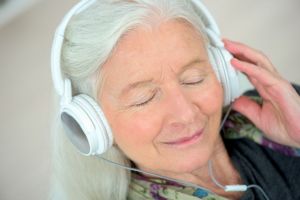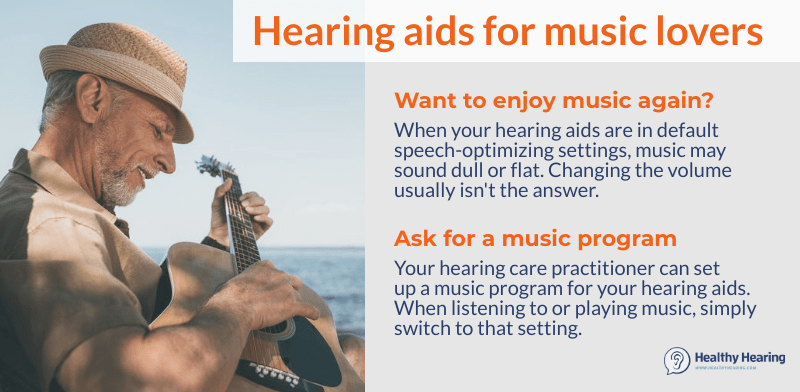|
www.HealthyHearing.com |
Hearing aids for music lovers
Contributed by Temma Ehrenfeld When you develop hearing loss, your ability to listen to and appreciate music will change. This can be an especially frustrating experience for musicians, but it can impact anyone's quality of life. In the past, hearing aids tended to make music sound distorted and compressed. But they have become much better at processing music in recent years. Some brands, such as the Oticon Real, even come with settings specifically tailored to optimally process music. A conversation with your hearing care provider about a custom hearing aid program could make a big difference. Don’t wait to be asked: You may need to bring up the subject yourself, one survey suggests.
Ask for a custom music settingMost modern hearing aids have customizable settings and programs, which are specialized pre-programmed settings that help people hear better in specific environments. Hearing care providers can create and customize these settings for different sound situations, such as conversation, noisy environments, music, etc. When you find yourself in that particular situation, you simply put your hearing aids into the program for that environment, either by using your remote, your smartphone app, or pushing a button on the hearing aid. Why is a music program helpful?Many people wonder, why would a music setting be necessary for hearing aids? The main purpose of hearing aids is to help people understand human speech better. When people are talking in normal conversation, their voices are usually in a volume range of 30 to 85 decibels. But that isn’t the whole story. Human speech sounds are also mainly in the frequency range of 250 to 6000 Hz. This means that in “normal” hearing aid settings, which are optimized for typical spoken conversation, the range or frequency and volume is smaller than what is used for music. A piano, for example, has about a 40 percent wider range in frequencies than the female voice. Music and conversation are very differentIn general, music has a much wider dynamic range of volume and frequency. This means that music often includes important sounds that are softer or louder than conversation sounds, and also sounds that are lower-pitched and higher-pitched that those sounds commonly found in speech. This can present a challenge for hearing aids.
Specialized programs to optimize music sound quality typically have more amplification in the lower frequencies, which can be very important for music enjoyment. If you’re having trouble with listening to music with your hearing aids, don’t hesitate to speak to your hearing care practitioner about this. He or she may be able to design a different program that can make a big difference. Also, keep in mind – all music situations aren’t created equally, either. If you play in a symphony, your music setting needs will be different than someone who wants to listen to music at home in an otherwise quiet environment. If might take some effort to customize music program settings to work best for you, but most people find that it’s worth doing. If you don't have a music settingIf you don't have a music setting, and your hearing aid is distorting music from a music player, radio, or TV, you might experiment with turning down the music volume, says Toronto audiologist Marshall Chasin, who specializes in working with musicians. If you have a volume control on your hearing aid, you could turn that up if needed, he says. If you have a mild or moderate hearing loss, you might simply take off the hearing aid. How hearing loss affects how music soundsWith hearing loss, music may increasingly sound "flat," and the lyrics may get harder to understand. If you're a music aficionado, you might notice that when a new instrument comes in, you're not sure which one it is. And if you also have tinnitus, you may find it hard to focus on the music instead of the buzzing. Musicians: Talk to your audiologist about problemsMusicians may sometimes not realize they have hearing loss when they listen to music because they are recreating it in their heads, much as Beethoven did when he was deaf, observed audiologist Ruth Reisman. "It is like a sixth sense," she says. If you are a singer or musical performer, hearing aids can alter the sound of your own voice or instrument, an effect called “occlusion.” Sometimes wearing one aid rather than two can solve the problem. You might need a more open ear piece or a hollow earmold, or it might help to lower the low frequency amplifications, Reisman says. The site Grand Piano Passion has a wealth of information for musicians with hearing loss, such as optimizing your hearing aids for music and how to personalize the music setting on your hearing aids. Other assistive listening devices can helpThis is where you’ll get the most help now, Chasin says. Note that your hearing care provider may make it possible for you to test out assistive listening devices before making a commitment. Headphones
worn over hearing aids can make it easier to listen to music at home. Amplified headphones can deliver signals more loudly than standard headphones do. A separate headphone “equalizer” allows you to boost low, mid and high frequencies to suit yourself. Noise-cancelling headphones may be worn over your hearing aids, so you don’t need to turn the music as high. Loops for live music or cinemaA hearing loop provides a wireless signal you can pick up on the ‘T’ (Telecoil) setting when using mobile phones or when you’re inside a cinema, church, concert hall or theater. Remote micYou can pick up live sound in a room by putting a remote microphone closer to the source. StreamersThese small devices ferry sound from other audio equipment wirelessly into your hearing aid. Ask your hearing care practitioner to enable a streaming program on your hearing aids. Hearing protection is still importantEven if you have hearing loss or wear hearing aids, as a musician or music-lover, you want to retain your residual hearing. The best way to do this is to wear earplugs for musicians, which allow for the full dynamic range of sound at a safer volume. Get help with treatmentA trusted hearing care provider is key to helping you find the right hearing aid, with the right programming, to optimize your listening experience for speech and music. Find a hearing specialist near you with our directory of providers.
Related Help Pages:
Hearing aids Types of hearing aids
|
Featured clinics near me
Earzlink Hearing Care - Reynoldsburg
7668 Slate Ridge Blvd
Reynoldsburg, OH 43068

Find a clinic
We have more hearing clinic reviews than any other site!


